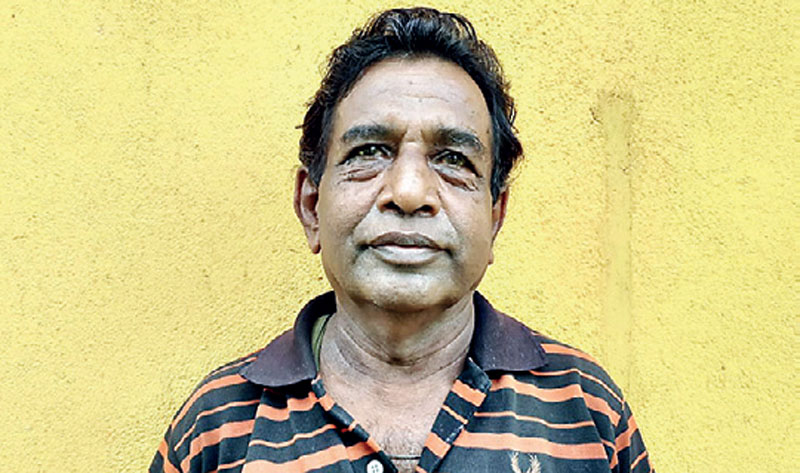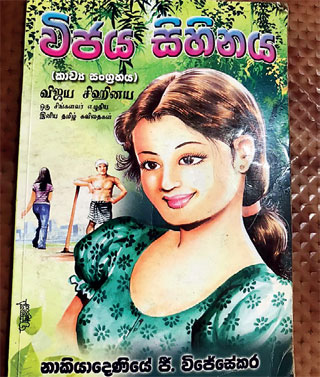Monday Feb 23, 2026
Monday Feb 23, 2026
Saturday, 23 July 2022 00:03 - - {{hitsCtrl.values.hits}}

Poet Nakiyadeniye G. Wijesekera
 In this world we learn many things. We learn to make complicated machinery for wars. We have destroyed the world with the atomic bomb. And some global vaccine investors have been busy warning the world of biological weapons in the form of viruses.
In this world we learn many things. We learn to make complicated machinery for wars. We have destroyed the world with the atomic bomb. And some global vaccine investors have been busy warning the world of biological weapons in the form of viruses.
All this points to the fact that we have turned this earth to a super modern, living hell. Empathy and caring, which are the ingredients of pure love, remain scarce.
Yet this world does have countless individuals who are champions of humaneness, who strive to link human beings in diverse ways; through art, poetry, dance and literature. And who do it for no personal gain.
Nakiyadeniye G. Wijesekera (Nanayakkara Wasam Hapugalage Gunadasa Wijesekera) is one such human being. He is today 70 years old and still ardently dedicated to keeping afloat the virtue of pure love in this world.
He communicates his message through his adopted language of Tamil, being one of the few Sinhalese poets writing in Tamil. Many of the poems have parallel Sinhala versions. All poems capture the diverse situations of the human condition of segments of society that most of us are oblivious to. In particular his poems capture the difficulties of the working class.
Below is one poem which speaks of the difficulties of surviving on a meagre salary and is titled ‘Kome pittuwa.’ The poem describes the vanishing nature of the salary of a labourer who toils for a pittance. He is surrounded by life’s glittering needs and wants. His salary rises like a giant kome pittuwa (sand structure) only to perish in no time. The metaphor used for the meagre salary is the sand made pyramid like structure which is a kome pittuwa (Sinhala wording) that children make on the beach and the cost of living is equated to the high Himalayas.
Childlike and endearing in nature that belies his age, Wijesekera smiles as he explains that he is self-taught in the Tamil language. His first teacher had been a teenager a few years younger than him who had earnestly taken upon herself the task of teaching him Tamil.
“It is now over 50 years ago. Word by word she taught me and I wrote them down in an old exercise book. Later I used the knowledge of this language to write poetry, long after she was gone,” he recalls.
His nostalgia is for a past he could not change and a love he could not attain but which he nevertheless transformed into universal love.
“What is love after all? It is a selfless, unattached phenomena of the heart which is meant to unite all of humanity. Love is not about possessing. Today what we see categorised as love in this world has no connection to humanity. It is mostly a commercial, possessive and selfish brand of attachment. The world is not run through love as it should,” he states lamenting on the rarity of kindness.
“Look at what you see the world over. Look at what you see in Sri Lanka. The uncaring, selfish attitudes that are infused in every segment of society. Human beings are used and discarded like old shirts. If I could get people to think deeply, after reading some of my poems, how some communities struggle through life I would be happy,” he states.
“Thinking about these things is not enough. We need people to carry out actions of love in this world transformed into national policy to prevent exploitation. Imagine if all those who were in powerful worldly positions did this?” he further asks. He believes that every human is powerful in their own way and can help change the world.
Growing up in and around the plantation areas of Nuwara Eliya in Lindula he had met the young girl in her early teens who taught him Tamil when working for a shop belonging to his brother in the area.
“I was almost her age and having dropped out of school around grade 6, was working. She was from an Indian Tamil family in the plantation area and they were running a small shop. I was from a Sinhala family. We were both children in actuality but we talked deeply of what we saw in the world. I recall how that young girl viewed life so beautifully and philosophically teaching me that children have an innate wisdom. Few years after we met, her family suddenly went to India,” he says.
“I did not know she was leaving. I have been writing poetry promoting humanity and empathy since then. I had no teacher for learning the Tamil language after she left and I can write a separate book on how I searched out different words in old newspapers, magazines and books to learn this language,” he explains with another of his calming smiles.
He states that his Tamil language used in poetry is simple and not what one would call ‘literary.’ But the reception his works have received in the Tamil press has encouraged him to write more and more, dedicating his poetry promoting the upholding of humane values. Most of the poems are published along with the Sinhala translation.
He has collated many of his early poems in his book titled Wijeya Sihinaya (the dream of Wijeya), published in 2011. The concept of ‘sihinaya’ or ‘dream’ is related to his vision of creating a more compassionate world.
He has now completed a new manuscript that has a collection of poems written in the past few years. Going about his plans to publish it, he is currently struggling with the rising printing costs.
The Tamil title of this latest book is ‘Ninevellam Unvasam’ and can be loosely translated as per his idea as ‘all thoughts hold the scent of love and humanity’ although the direct translation means ‘all thoughts hold the scent of you.’ The ‘you’ here could be seen as a direct reference to the reader to address the humanity within himself or herself to view the world. At another level it could be also seen as a set of love poems. Wijesekera who had dedicated his life to the task of silently and inconspicuously building love and peace in society, does this on his own volition. Why he is doing it is not because any organisation or persons tell him to do so. He has no agendas except the agenda of love.
“I have not been connected to any NGO or anything like that because I do not want to be paid or make money out of creating peace. I think it is every human being’s task to bring about peace in this world he or she is born to,” he states.
“In Sri Lanka I want to appeal to people to understand each other. My message to all Sri Lankans is: Please do not discriminate against people based on petty boundaries of race and religion. We have to appreciate diversity. Imagine if all birds of this earth were the same! How terrible! We need to appreciate the difference and uphold our own language, religion and culture and appreciate that of others. But none of us should have an ‘umathuwa’ (madness) about it. It is this madness that makes this world mad,” he explains. His lifelong journey of mastering the Tamil language in a bid to write poetry to connect people has won him many friends in the Tamil speaking districts of Sri Lanka.
“As a child and youth I lived among the plantation Tamils who originally came from India. I saw their suffering. I still see their suffering as my subsequent jobs throughout my life have been in and around the tea sector of Sri Lanka,” he states.
He is currently working in the Galle district where he lives with his wife and children. In his free time he travels around Sri Lanka for literary interests,
He visits the north, east and other areas of the country and constantly makes friends with different writers and artists around the island.
“If I did not know the Tamil language I would not be able to do this. A language is an asset. Learning an additional language used in this world is always useful. In Sri Lanka we use three languages and although I do not know much English, learning Tamil helped me communicate and understand so many people within this country,” he states.
As one listens to his wisdom and knowledge, one wonders how those who become purportedly ‘highly educated’ in schools and universities lack his humaneness. It teaches us a lesson that intangible cultural heritage of the world which includes spirituality, art, dance, poetry and literature should be given greater emphasis as it opens the heart to deeper understanding and reflection.
Wijesekera was one of the participants at the North-South exchange held earlier this year linking the two regions through intangible cultural heritage; focusing on art, poetry and drama.
The program was held at the Governor Secretariat in the north under the patronage of Northern Governor Jeevan Thiagaraja and supported by the Office for National Unity and Reconciliation (ONUR). The program was initiated and conceptualised by Frances Bulathsinghala who uses spirituality, indigenous knowledge and intangible heritage for peacebuilding communication.